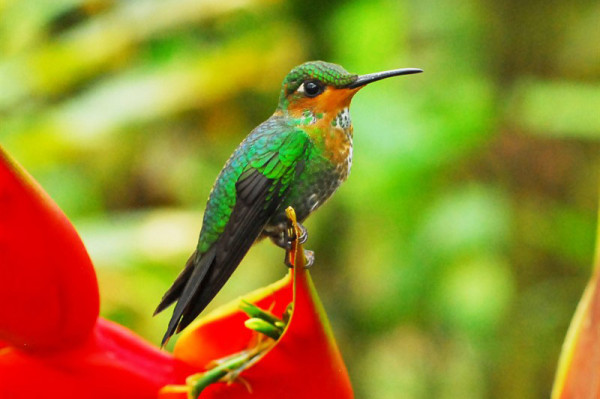Implementing measures that promote the sustainable use of biodiversity is a worthwhile investment that will bring multiple economic and environmental benefits to countries, according to a United Nations-backed report released on 7 October 2014.
The report, released at the 12th meeting of the Conference of the Parties to the Convention on Biological Diversity (COP-12) in Pyeongchang, Republic of Korea, found that there is a gap across all countries and regions between investments needed to meet the 20 global biodiversity goals known as the Aichi targets, and the resources currently allocated to this endeavor.*
“Even though political commitment is there, we don’t have a good financial investment plan behind it,” said Carlos Manuel Rodriguez, Chair of the High-Level Panel on Global Assessment of Resources for Implementing the Strategic Plan for Biodiversity 2011-2020, which authored the report.
“The report will help parties understand how we can develop these financial investment plans.”
The report also highlights benefits in areas such as health and well-being and food security that would benefit from higher investments in biodiversity initiatives.
Source: UN News Centre
Rodriguez, who is also the Vice President for conservation policy at Conservation International, stressed that countries should not simply think of higher expenditures, but they need to look for innovative ways in which development investments also take into account biodiversity.
“Political coherence is urgently needed at the country level,” Rodriguez said.
“If we see how governments behave it’s quite contradictory. On the one hand, we see agencies promoting development with a high environmental cost, and on the other hand we see environmental agencies trying to repair the damage that development agencies have created. We need governments who are able to break down this kind of silo effect.”
Recommendations in the report include diversifying sources of finance for biodiversity; investing in protecting marine and land ecosystems with the view that this will tackle not just biodiversity issues but also wider development issues such as climate change; and strengthening dialogue between governments, the private sector and civil society on biodiversity initiatives.
“We hope that this report will allow parties to move forward actions at the national level as well as the Convention level that are consistent with the political commitment of the Aichi targets,” Rodriquez added. (*Source: UN Release).
Read also:
‘Indigenous Knowledge Essential to Halting Biodiversity Loss’
Five Garbage Patches Occupy 15, 915, 933 Square Kilometers of Ocean
Financial Damage of Plastic to Marine Ecosystems Stands at Over US$13 Billion Each Year
Plastic Waste Causes $13 Billion in Annual Damage to Marine Ecosystems — UN
To Combat Hunger, UN Launches Initiative for Sustainable Use of World’s Oceans
‘Devastating’ Effects from Ongoing Destruction of Mangrove Forests
Forests Provide Jobs, Energy, Nutritious Foods and Ecosystem Services – Do Not Kill Them!
Forests Can Play a Crucial Role in Improving Global Food Security, Nutrition
Forests, a Matter of Life or Death for 1.6 Billion People!
1.6 Billion People Depend on Forests, But…
“As Long as There Is One of Us Standing, There Will Be a Fight to Protect the Forests”
Have Destroyed the Amazon? No Problem, Forests Will Pay the Bill
‘How KFC Is Junking the Jungle’
Save The Planet? Just Eat Cars, Drink Fuel!
Big Business Suffocating Our Lungs
All the Benefits of Amazon Plants and Foods in a UN Book
Eighty Per Cent of World’s Forests Degraded, Destroyed
2014 Human Wrongs Watch
People Have Never Consumed So Much Fish As They Do Today
Dirty Fossil Fuel, Oil Drilling, Industrial Fishing, Conflicts… The Arctic Dies!
2014 Human Wrongs Watch











